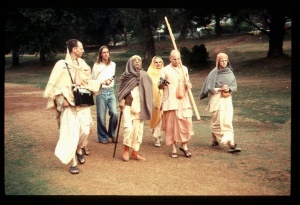SB 2.2.21

A.C. Bhaktivedanta Swami Prabhupada
TEXT 21
- tasmād bhruvor antaram unnayeta
- niruddha-saptāyatano 'napekṣaḥ
- sthitvā muhūrtārdham akuṇṭha-dṛṣṭir
- nirbhidya mūrdhan visṛjet paraṁ gataḥ
SYNONYMS
tasmāt — from there; bhruvoḥ — of the eyebrows; antaram — in between; unnayeta — should be brought in; niruddha — by blocking; sapta — seven; āyatanaḥ — outlets of the life air; anapekṣaḥ — independent of all material enjoyment; sthitvā — by keeping; muhūrta — of a moment; ardham — half; akuṇṭha — back home, back to Godhead; dṛṣṭiḥ — one whose aim is targeted like that; nirbhidya — punching; mūrdhan — the cerebral hole; visṛjet — should give up his body; param — the Supreme; gataḥ — having gone to.
TRANSLATION
Thereafter the bhakti-yogī should push the life air up between the eyebrows, and then, blocking the seven outlets of the life air, he should maintain his aim for going back home, back to Godhead. If he is completely free from all desires for material enjoyment, he should then reach the cerebral hole and give up his material connections, having gone to the Supreme.
PURPORT
The process of giving up all material connections and returning home, back to Godhead, the Supreme, is recommended herein. The condition is that one should be completely freed from desire for material enjoyment. There are different grades of material enjoyments in respect to duration of life and sensual gratification. The highest plane of sensual enjoyment for the longest period of life is mentioned in the Bhagavad-gītā (BG 9.20). All are but material enjoyments, and one should be thoroughly convinced that he has no need of such a long duration of life, even in the Brahmaloka planet. He must return home, back to Godhead, and must not be attracted by any amount of material facilities. In the Bhagavad-gītā (BG 2.59) it is said that this sort of material detachment is possible to attain when one is acquainted with the supreme association of life. Paraṁ dṛṣṭvā nivartate. One cannot be freed from material attraction unless he has complete understanding of the nature of spiritual life. The propaganda by a certain class of impersonalists that spiritual life is void of all varieties is dangerous propaganda to mislead the living beings into becoming more and more attracted by material enjoyments. As such, persons with a poor fund of knowledge cannot have any conception of the param, the Supreme; they try to stick to the varieties of material enjoyments, although they may flatter themselves as being Brahman-realized souls. Such less intelligent persons cannot have any conception of the param, as mentioned in this verse, and therefore they cannot reach the Supreme. The devotees have full knowledge of the spiritual world, the Personality of Godhead and His transcendental association in unlimited spiritual planets called Vaikuṇṭhalokas. Herein akuṇṭha-dṛṣṭiḥ is mentioned. Akuṇṭha and vaikuṇṭha convey the same import, and only one who has his aim fixed upon that spiritual world and personal association with the Godhead can give up his material connections even while living in the material world. This param and the paraṁ dhāma mentioned in several places in the Bhagavad-gītā are one and the same thing. One who goes to the paraṁ dhāma does not return to the material world. This freedom is not possible even by reaching the topmost loka of the material world.
The life air passes through seven openings, namely two eyes, two nostrils, two ears and one mouth. Generally it passes through the mouth at the time of an ordinary man's death. But the yogī, as above mentioned, who controls the life air in his own way, generally releases the life air by puncturing the cerebral hole in the head. The yogī therefore blocks up all the above-mentioned seven openings, so that the life air will naturally burst forth through the cerebral hole. This is the sure sign of a great devotee's leaving the material connection.